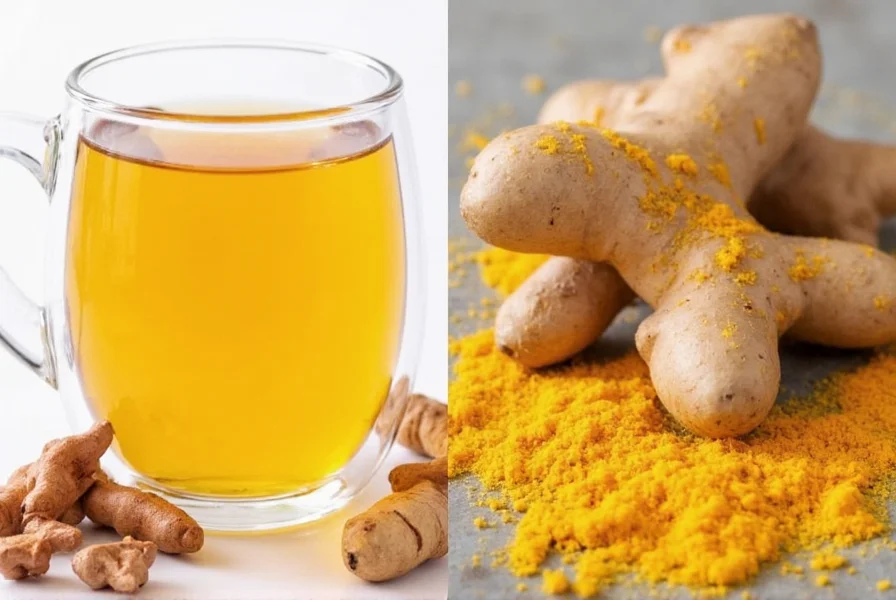For centuries, traditional medicine systems have utilized turmeric and ginger for their healing properties. Modern research now validates many of these traditional uses, particularly when these powerful roots are combined in tea form. This comprehensive guide explores the evidence-based benefits of turmeric ginger tea, preparation methods that maximize bioavailability, and practical recommendations for incorporating this potent beverage into your wellness routine.
The Science Behind Turmeric Ginger Tea Benefits
Turmeric contains curcumin, a compound with powerful anti-inflammatory and antioxidant effects. Ginger contributes gingerols, which provide similar benefits plus digestive support. When combined in tea, these compounds work synergistically to enhance each other's absorption and effectiveness.
Research published in the Journal of Medicinal Food demonstrates that the combination of turmeric and ginger creates a more potent anti-inflammatory effect than either ingredient alone. This synergy explains why traditional preparations often combine these roots for maximum therapeutic benefit.
Top 7 Evidence-Based Turmeric Ginger Tea Benefits
1. Powerful Anti-Inflammatory Effects
Chronic inflammation underlies many modern diseases. The curcumin in turmeric inhibits multiple inflammation pathways at the molecular level. A 2021 review in Nutrients found curcumin's anti-inflammatory effects comparable to some pharmaceutical drugs, but without the side effects. Ginger compounds complement this action by blocking inflammatory cytokines.
2. Enhanced Antioxidant Protection
Oxidative stress damages cells and accelerates aging. Turmeric ginger tea delivers a double dose of antioxidants that neutralize free radicals. Studies show this combination significantly increases the body's antioxidant enzyme levels, providing protection against cellular damage that contributes to chronic disease development.
3. Improved Digestive Health
Ginger stimulates digestive enzymes while turmeric reduces gut inflammation. This powerful combination alleviates symptoms of indigestion, bloating, and irritable bowel syndrome. Research in the World Journal of Gastroenterology confirms ginger's effectiveness for accelerating gastric emptying, while turmeric's anti-inflammatory properties soothe irritated intestinal lining.
| Benefit | Key Compounds | Scientific Support Level |
|---|---|---|
| Anti-inflammatory | Curcumin, Gingerols | Strong (Multiple RCTs) |
| Antioxidant | Curcuminoids, Zingerone | Strong |
| Digestive Support | Gingerols, Turmerones | Moderate to Strong |
| Joint Pain Relief | Curcumin, Shogaols | Moderate |
| Immune Support | Polysaccharides, Essential Oils | Preliminary |
4. Natural Pain Relief
For those seeking alternatives to NSAIDs, turmeric ginger tea offers natural pain management. Clinical trials show curcumin reduces osteoarthritis pain as effectively as ibuprofen, while ginger's analgesic properties target muscle soreness and menstrual discomfort. The combination provides multi-targeted pain relief without gastrointestinal side effects common with pharmaceutical options.
5. Cardiovascular Support
Regular consumption improves endothelial function (blood vessel health) and reduces markers of heart disease. A study in the Journal of Nutrition and Metabolism found that daily turmeric ginger tea consumption lowered LDL cholesterol and triglycerides while improving blood flow. The anti-inflammatory effects also protect against atherosclerosis development.
6. Immune System Modulation
Unlike immune boosters that overstimulate, turmeric ginger tea modulates immune function. Curcumin regulates immune cell activity, while ginger enhances white blood cell response to pathogens. This balanced approach supports immune defense without triggering autoimmune reactions, making it suitable for year-round consumption.
7. Cognitive Function Enhancement
Emerging research suggests neuroprotective benefits. Curcumin crosses the blood-brain barrier, reducing brain inflammation and potentially lowering Alzheimer's risk. Ginger compounds protect against oxidative damage in neural tissue. While more human studies are needed, preliminary evidence supports regular consumption for long-term brain health.
Maximizing Turmeric Ginger Tea Benefits Through Proper Preparation
The bioavailability of curcumin is notoriously low. To maximize turmeric ginger tea benefits:
- Add black pepper (contains piperine which increases curcumin absorption by 2000%)
- Include healthy fats (coconut oil or ghee) to enhance absorption of fat-soluble compounds
- Use freshly grated roots rather than powders for higher active compound concentration
- Simmer for 10-15 minutes to extract maximum beneficial compounds
- Consume consistently (daily for at least 4-8 weeks) to experience cumulative benefits

Safety Considerations and Potential Side Effects
Turmeric ginger tea is generally safe for daily consumption, but certain precautions apply:
- May interact with blood thinners (consult physician if taking anticoagulants)
- Ginger may cause mild heartburn in sensitive individuals
- High doses might lower blood sugar (monitor if diabetic)
- Generally safe during pregnancy in culinary amounts, but consult healthcare provider
- Discontinue 2 weeks before surgery due to potential blood-thinning effects
Recommended Daily Intake for Optimal Benefits
Research suggests consuming 1-2 cups daily provides significant health benefits without risk of side effects. Each cup should contain:
- 1-inch fresh turmeric root (or 1/2 teaspoon powder)
- 1-inch fresh ginger root (or 1/2 teaspoon powder)
- Pinch of black pepper
- Optional: 1 teaspoon healthy fat (coconut oil)
- 8-12 ounces of hot water
For maximum turmeric ginger tea for inflammation benefits, consume consistently for at least 6-8 weeks. Many users report noticeable improvements in joint comfort and digestion within 2-4 weeks of regular consumption.
Turmeric Ginger Tea vs. Supplements: Which Offers Greater Benefits?
While supplements provide concentrated doses, whole-food preparations like turmeric ginger tea offer advantages:
- Natural synergy between compounds enhances overall effectiveness
- Lower risk of side effects compared to high-dose supplements
- Additional hydration benefits from the tea itself
- No risk of exceeding safe dosage levels
- More affordable and accessible than quality supplements
For most people seeking daily turmeric ginger tea consumption benefits, the tea provides an ideal balance of efficacy, safety, and cost-effectiveness. Supplements may be appropriate for specific therapeutic goals under medical supervision.

Creating Your Perfect Turmeric Ginger Tea Blend
Customize your tea for specific health goals:
- For inflammation: Add cinnamon and cloves for additional anti-inflammatory compounds
- For digestion: Include fennel seeds and mint leaves
- For immunity: Add lemon juice (vitamin C) and a small piece of garlic
- For relaxation: Blend with chamomile or tulsi (holy basil)
The versatility of how to make turmeric ginger tea for maximum benefits allows personalization based on individual health needs and taste preferences.
Conclusion: Integrating Turmeric Ginger Tea Into Your Wellness Routine
Turmeric ginger tea represents a powerful, evidence-based addition to any health-conscious lifestyle. Its scientifically-supported benefits for inflammation, digestion, immunity, and overall wellness make it a valuable daily ritual. By understanding proper preparation methods and realistic expectations, you can maximize the health benefits of turmeric ginger tea while enjoying a delicious, comforting beverage.
Consistency matters more than intensity when harnessing the full potential of this ancient remedy. Incorporate turmeric ginger tea into your daily routine, and you'll likely notice gradual but meaningful improvements in your overall wellbeing.
Frequently Asked Questions
How long does it take to experience turmeric ginger tea benefits?
Most people notice digestive improvements within 1-2 weeks of daily consumption. Significant anti-inflammatory effects typically require 4-8 weeks of consistent use. Research shows maximum benefits occur with regular consumption over 3-6 months, as the compounds accumulate in the body and produce cumulative effects.
Can I drink turmeric ginger tea on an empty stomach?
Yes, turmeric ginger tea can be safely consumed on an empty stomach and may actually enhance absorption of active compounds. However, those with sensitive stomachs might experience mild discomfort. If this occurs, consume with a small amount of food or add a teaspoon of healthy fat like coconut oil to the tea to reduce potential irritation while improving curcumin absorption.
Does turmeric ginger tea help with weight loss?
While not a direct weight loss solution, turmeric ginger tea supports metabolic health in several ways. It reduces inflammation that can contribute to weight gain, improves digestion for better nutrient absorption, and may help regulate blood sugar levels. Some studies suggest curcumin helps prevent fat tissue expansion. When combined with a healthy diet and exercise, it can be a supportive element in weight management.
What's the best time of day to drink turmeric ginger tea?
Morning consumption provides anti-inflammatory benefits throughout the day and supports digestion of subsequent meals. Some prefer it in the evening for its mild relaxing properties, though ginger's stimulating effect might interfere with sleep for sensitive individuals. For maximum scientific evidence for turmeric ginger tea benefits, consistency matters more than timing—choose a time you can maintain daily.
Are there any medications that interact with turmeric ginger tea?
Turmeric and ginger may interact with blood thinners (warfarin, aspirin), diabetes medications, and certain chemotherapy drugs. They can enhance the effects of these medications, potentially causing adverse reactions. If taking prescription medications, consult your healthcare provider before regular consumption. The risk of interactions is lower with tea than supplements, but caution remains important for those on medication regimens.











 浙公网安备
33010002000092号
浙公网安备
33010002000092号 浙B2-20120091-4
浙B2-20120091-4